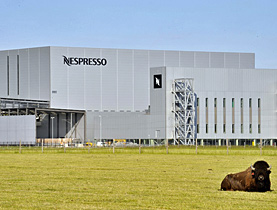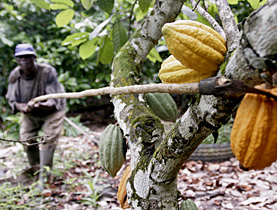Chocolate is still a sure bet for Nestlé

Swiss food and beverage giant Nestlé is weathering the economic downturn better than many other companies thanks to – among other factors – its chocolate business.
As a sign of this good health, Nestlé will open on Monday a chocolate excellence centre in Broc, canton Fribourg, on the site of one of its oldest production facilities.
Chocolate, along with other confectionery, constitutes a large chunk of Nestlé’s business. It represents 11.3 per cent of the company’s turnover, less than its beverage sector, but still more than fresh milk products.
“The Nestlé brand is intrinsically linked to chocolate production,” said René Weber, an analyst at Vontobel Bank. “That’s why I don’t believe the rumour about the group selling it off.”
Rumours started as a result of the consolidation movement that has taken place in the confectionery sector over the past few years. With the Cadbury-Adams and Mars-Wrigley mergers, Nestlé now faces two competitors with bigger market shares.
For the moment though, the chocolate business is not affected by the economic crisis, according to Bank Bordier analyst Christophe Laborde. Nestlé’s decision to invest in its new chocolate centre makes sense in light of current trends.
“Chocolate makers want to control the entire production process, from research and development (R&D) to the final product as well as the raw materials,” he told swissinfo.ch.
This strategy helps keep a grip on costs, which are influenced by suppliers, producers and contractors. “That allows chocolate makers to not be too affected by variations in the cost of their basic raw material, cocoa, which is being sold at historically high prices,” Laborde added.
Investments
Switzerland has been fortunate with Nestlé over the past decade. The multinational has invested an estimated SFr2.5 billion ($2.35 billion) and created 2,300 jobs (out of a total of 9,000) during that period.
One-fifth of its research investments stay at home too, even though the Swiss market represents just two per cent of its turnover.
“For products with high added value like Nespresso and R&D, Switzerland is a good location,” Weber told swissinfo.ch. “Quality of life and working conditions here make it easier to attract staff.”
Nestlé remains a global player though, a fact that has contributed to keeping afloat in tough economic times, according to Weber. Growth in Asia has helped overcome a decline in sales in Spain, for example.
Sales however dropped slightly during the first half of the year and growth for 2009 is expected to be lower than initially planned.
The group’s capacity to weather the crisis also lies in the fact that its activities are largely recession-proof and that its brands are well positioned.
Other factors include efforts to cut down on costs and a long-term growth strategy – focusing on core business and increasing productivity. Lower milk prices have also helped Nestlé.
“A company does not have to pass on entirely the effects of lower prices to its customers,” explained Laborde. “It can keep prices and margins at a reasonable level, and use whatever is left over to promote its products more.”
Crossroads
Laborde reckons that overall profits will be down over the next few months, put under pressure by falling prices. He adds that the group’s size makes it difficult for Nestlé to find ways of increasing growth.
But Weber says that growth in developing countries and an increasing global population will be all the company needs. “It’s difficult to find any weaknesses with this group,” he points out.
Laborde is not so sure. “Nestlé is so huge that the potential for substantial growth is not there,” he told swissinfo.ch. “Purchasing a competitor’s division in a specific sector won’t boost growth.”
The Bordier analyst believes Nestlé is at a crossroads. The company must decide what to do with ophthalmological specialist Alcon. It has already sold one-third of its shareholding to Swiss pharmaceutical giant Novartis.
Once it completes the sale of its remaining shares to Novartis in 2010 or 2011, Nestlé will be giving up an important source of profits, with a profit margin of about 34 per cent. But it could also earn SFr25 billion from the share sale.
What it would do with this cash remains unclear. Nestlé could reduce its debt and launch another share buyback operation to boost shareholder profits. Or it could purchase another company to increase growth and improve its margins.
Pierre-François Besson, swissinfo.ch (Translated from French by Scott Capper)
Nestlé announced in August a 1.5 per cent drop in its sales to SFr52.3 billion ($48.3 billion) for the first six months of 2009, compared with 2008 figures.
The multinational reported a net profit of SFr5.1 billion, which amounts to 9.7 per cent of sales.
The company said it achieved 3.5 per cent organic growth and the group’s EBIT grew to SFr7.4 billion.
It also announced that it completed the first stage of its SFr25 billion share buyback programme, amounting to SFr15 billion, on July 28.
A second stage, worth SFr10 billion, is under way.

In compliance with the JTI standards
More: SWI swissinfo.ch certified by the Journalism Trust Initiative












You can find an overview of ongoing debates with our journalists here . Please join us!
If you want to start a conversation about a topic raised in this article or want to report factual errors, email us at english@swissinfo.ch.